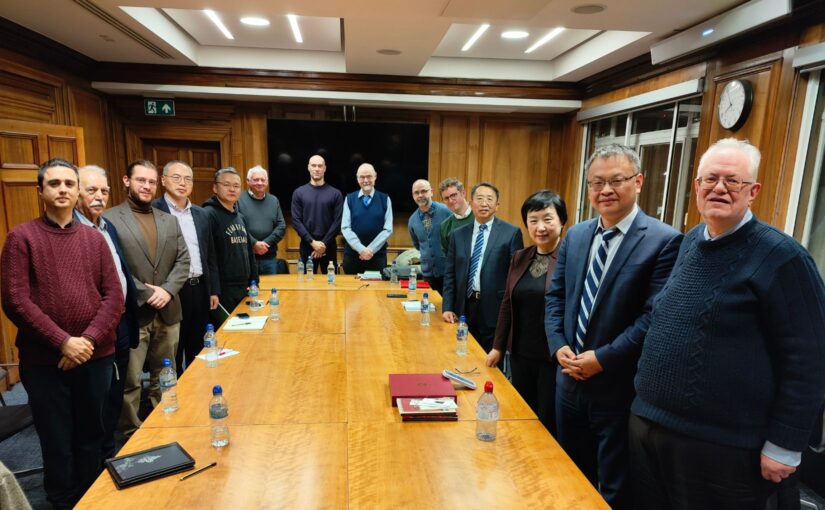On Tuesday 14 January 2025, Friends of Socialist China hosted a roundtable discussion in London with a group of seven academics from the School of Marxism at Shanghai’s Fudan University, one of China’s leading academic institutions. The meeting was attended by ten members and allies of Friends of Socialist China’s Britain committee, and was coordinated by Efe Can Gürcan, an adjunct professor at Shanghai University and visiting professor at the London School of Economics (LSE).
The delegates from Fudan – professors Gao Guoxi, Mei Xian, Zhang Xinning, Wu Haijing, Gao Xiaolin, Zhang Qifeng and Cui Hanbing – described their areas of research, which include moral philosophy, Marxist ethics, political economy, the history of the Communist Party of China (CPC), and the image of the CPC overseas.
Following introductions, there was a wide-ranging discussion based on a number of questions posed by the Fudan delegates.
A particularly lively discussion took place in response to the question of what European socialists think about China’s development. Friends of Socialist China co-editor Keith Bennett provided an overview of the British left’s relationship with the Chinese Revolution and the People’s Republic of China, starting with the work of the Communist Party of Great Britain in extending solidarity to the CPC and the Chinese people’s struggle for liberation from the 1920s.
Keith noted that this relationship weakened from the 1960s with the emergence of the Sino-Soviet Split. Meanwhile there were a variety of trends in the British (and Western) left, broadly falling within the parameters of what Domenico Losurdo writes about in his Western Marxism (published for the first time in English last year), that have always tended to display a dismissive, doctrinaire and ultra-left approach to Chinese socialism and actually existing socialism in general. Nevertheless, despite these twin challenges, and although to a lesser extent compared to some other developed countries in Europe, North America and Australasia, many people mobilised by the youth and student upsurge and the emergence of new social movements, were inspired by events in China to varying extents. However, changes in China’s economic strategy and its engagement with the global left from the late 1970s contributed to confusion and disillusionment among significant sectors of the socialist and progressive movements in the West.
Keith added that in recent years however, for a number of reasons, this dynamic is starting to shift in a positive direction, with renewed interest in Chinese socialism and China’s role in the world. Partly this is due to the very clear emphasis placed under the leadership of General Secretary Xi Jinping on the importance of Marxism-Leninism and Mao Zedong Thought. But it also reflects a deepening economic and political crisis in the West, and the comparison between Western dysfunction and the extraordinary progress being made in China on poverty alleviation, improvement of people’s living standards, environmental protection, and so on. As a result, there is more scope now for building understanding of Chinese socialism than there has been for at least four decades.
Comrades who had recently returned from representing Friends of Socialist China at the inauguration of President Nicolás Maduro in Caracas commented on how differently China is perceived in Venezuela and other countries outside the Global North. They noted that Britain’s colonial history continues to impact people’s worldviews, and that a decolonial perspective is needed in order to develop a deeper understanding of China’s rise and its role in the struggle against imperialism.
The comrades from Fudan also introduced the issues of the changing nature of the working class as well as to the structure of global capitalism in recent decades. Friends of Socialist China co-editor Carlos Martinez highlighted the importance of continuing to define class in terms of relationship to the means of production, as part of a process of building unity around the shared interests of the working class. This connects to the importance of building understanding of China, since China provides an inspiring example of what the working class and its allies in power can achieve. The fundamental reason that China has had world-historic successes in poverty alleviation, technological development, improvement of living standards and more is that it is led by a Communist Party, guided by the principles of Marxism adapted to Chinese reality and traditions, and with a state system led by the working class and based on an alliance of workers and peasants.
A number of comrades contributed to a discussion of capitalism in its current neoliberal, financialised form, describing how the system’s declining rate of profit and inability to suppress China’s rise are leading the US and its allies to ever more reckless militarism and adventurism.
Concluding the meeting, the delegates from Fudan University and Friends of Socialist China discussed several interesting and inspiring ideas for further cooperation and coordination in the coming period.

